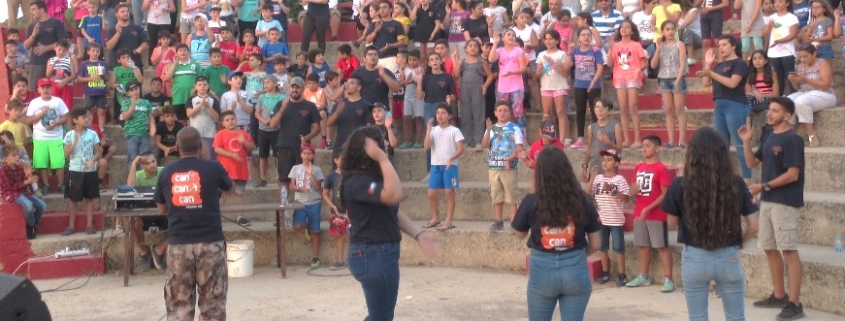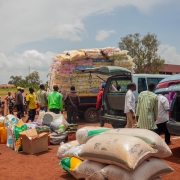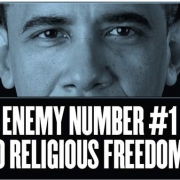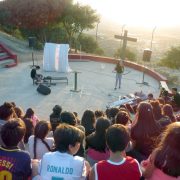The Chairman’s Report for July 12, 2019
In this issue of the newsletter:
New: Day by day description of an eight-day mission to the Middle East
Update: Summer Camp improvements in Jordan for Christian youth
Update: Day care center air conditioners installed and working well for children
Update: Diaper program in Iraq well, but more adult diapers needed for infirm
June Middle East mission finds accomplishments, new areas of need
The mission begins: I usually write about the results of a mission trip, but not about the trip itself. This month I wanted to give some insight into what exactly happens on one of these trips. We departed Washington’s Dulles Airport at 9:30 PM on Monday and arrived in Paris at about 10:00 AM on Tuesday. We had a long layover that was made worse by weather delays. Our flight from Paris to Amman, Jordan took five hours after we made it in the air, and we arrived at nearly midnight. We finally checked into our hotel at 2:00 AM on Wednesday.
That same Wednesday morning, ministry director Isam Ghattas took us to visit several aid operations we support in Amman. These are critical ministries, as Jordan has the 2nd highest share of refugees per capita in the world, including many Christian refugees from Syria and Iraq. To protect the jobs of its citizens, Jordan forbids refugees from seeking regular jobs, on pain of deportation. The Christian community there helps the refugees as much as they are able, but they are poor themselves and cannot meet all of their needs. In the afternoon, we visited Camp Gilead, a Christian summer camp for children which RFC donors have supported for many years. Projects have included a high fence and government mandated security cameras to protect the camp, we also paid for an improved water system, freezers for the kitchen, a playground for younger children, and several other improvements.

We inspected the new improvements and I talked with the camp director, the camp counselors and some of the children. As I have often mentioned, the camp is on the rim of the Jordan Valley (actually a great rift), and Israel can be seen across on the other side. No matter what, I always remain at the camp during the sunset service held in the small amphitheater facing Israel.
A large cross stands at the center of the theater and it is a joy to watch the children sing praises to the Lord as they look upon the cross. In a nation that is 97% Muslim, the Christian kids do not often have the opportunity to interact freely with each other the way they can at the camp. Many families can afford only the free public schools, where Muslim verses are in the textbooks, only Muslim holidays are observed, and non-Muslims may be intimidated.
Kids of different ages stay at Camp Gilead on different days. On our day there, the camp was open to ages 6, 7 and 8 and it was obvious they were having a joyous time, as they were learning how to become closer to Jesus. We arrived back at our hotel in Amman late that day.
The West Bank: The next morning, Thursday, we packed up and drove from Amman to the Bethlehem area. To do this we had to drive to the bottom of the Jordan Valley and across the Jordan River at the Allenby Bridge. Amman, Jordan has an average elevation of 3,000 feet. At the Allenby Bridge the Jordan River is below sea level, and it is really hot there. By the time the river reaches the Dead Sea, it is 1,400 feet below sea level.
Crossing the bridge is not an easy task; no one can cross in a private car (except a few officials with special clearance). We were dropped off and taken by an official bus across to Israel immigration and customs, which is much more stringent than that in Jordan. Once through the process, we loaded our luggage into a waiting car for the rest of our journey. Our first stop was the day care center in Beit Sahour which is part of greater Bethlehem. Beit Sahour is the last community within the “West Bank” that is majority Christian.
Our work is making a difference: When we arrived at the day care center in Beit Sahour (Beit means house and Sahour means shepherds) in the Bethlehem area, toddlers were taking their naps on mats under the air conditioners we had purchased. Walking through the now fully air-conditioned day-care center was a blessing for my wife Nancy and me.

The project cost just $7,000 to complete, which includes the rewiring that was required and the purchase of the six units. Two of the rooms, which were for babies under one year old, already had air conditioning. We supplied the new units for the two, three and four-year-olds.
Why did we buy six wall units instead of central air? … In most nations of the world air conditioning is done per room with built in wall units, not with central air. This saves a lot of energy and money particularly at night when only bedrooms are in use.
We were greeted by the head of the day care and the chairwoman of the organization that provides not only the day-care but other services for Christian women and children. As it was summer there were fewer children in the day-care, but there were still many children. The committee was extremely grateful for the new air conditioners, because the day-care had been functioning for several years with no air conditioning for the children over one-year-old.

We ate a late lunch with the Board of Directors before heading to Jerusalem for meetings and to spend the night. We stayed at the Notre Dame Hotel which was built by the Catholic Church for pilgrims in 1888. It is not large and is by no means a luxury hotel, but it is across the street from the New Gate of the Old City.
As we always do when in Jerusalem, we paid a visit to the Church of the Holy Sepulchre. No Christian should visit the Holy Land without walking through the church. Helena, the mother of Emperor Constantine, identified the location as the place of Crucifixion. She had a pagan temple at the location destroyed, and Emperor Constantine ordered the construction of the church in 336. It was first burned to the ground by the Persians and then rebuilt, and has since been damaged by earthquakes and been trampled by Muslim armies, but it still stands, and a feeling of holiness still resides there.
The Iraqi mission: On Friday morning after meetings with some local Christian officials in the West Bank, we headed back across the Allenby Bridge which this time consumed more time and arrived back in Amman, Jordan in the afternoon.
We had to leave our hotel at 10:00 PM and head to the airport for a 1:00 AM flight to Erbil, Iraq. We arrived in Erbil at 3:00 AM on Saturday and went through immigration and customs. We finally arrived at our hotel at 4:30 AM.
Our first mission that Saturday was at 9:30 AM about five hours after checking in to our hotel and it involved driving to Qaraqosh for a distribution of diapers to families, and interviews with families requiring adult diapers for special needs.

Our adult diaper program keeps expanding and I needed to talk firsthand to the families that are receiving the diapers to understand the need better. I was also wondering why the need had grown so quickly.
For many of the elderly the need came from lack of medical care at the early stages of urinary and other issues. But I also discovered that there were many adults and children who have required the diapers since birth because of severe neurological issues. I had not realized how the chaos and destruction of war hampers medical treatment of all kinds, including safe delivery of babies who may be deprived of oxygen at critical times.
Because of the distances and the many security check points, a drive to Qaraqosh from Erbil and back took most of the day after the interviews and distributions.
Sunday is a normal workday in Iraq because it is a majority Muslim nation. The official weekend is Friday and Saturday. On Sunday we held several diaper distributions in Erbil to Iraqi and Syrian families. We have just recently begun distributions of diapers to Syrian Christian families in the Erbil area. Until about a year ago there were virtually no Syrian refugees there. Two factors changed that. The Syrian Army with the help of the Russians cleared out the Islamic State and other terror groups from the southern crossing of Syria into Iraq.
NOTE: The United States occupies the entire northeastern section of Syria where the oil wells are. The Syrian government has no access to the oil wealth of the nation. Saudi Arabia is financing the construction of a Sunni government in that northeastern sector of Syria. Recently Saudi officials met in that area of Syria with Joel Rayburn who is the Deputy Secretary of our State Department. Basically, the oil wealth of Syria is being stolen by Saudi Arabia. While officials refer to it as “the Kurdish area” it is only 15% Kurdish. Much of the population are Christians who are being oppressed.
Most of the Syrian families that have recently come to Iraq have special needs children. This is the hard part to explain … They left Syria because medicine for neurological disorders suddenly became unavailable after the U.S cruise missile attacks in April 2017. One of the locations bombed was the only pharmaceutical factory manufacturing these types of drugs. The United States has an embargo on Syria including medical supplies, so nothing gets in. Families with adults and children in need of these drugs had no choice but to leave.
We visited the homes of two such families Sunday afternoon, one with a nine year old boy and the other with a sixteen year old girl.
Later Sunday we held additional meetings with ministry officials concerning the diaper programs and the upcoming Christmas program which we must start the planning for now.
The Christmas for Refugees program will be larger this year and in more areas of the Nineveh Plain as Christians move back to their destroyed homes and try to rebuild.

Monday was our last day in Iraq and our last full day in the Middle East. It had been less than seven days since we departed Washington, DC and we had been in Amman, Jordan, Beit Sahour in the Palestinian territories, Jerusalem, Israel and several locations in Iraq.
Monday morning, I headed out to Bartella alone as Nancy had become ill the night before. This was going to be a long day. There are five military check points to Bartella and five back to Erbil. In Bartella diapers were distributed to both families with infants and toddlers and to special needs adults. In Bartella I spent time in the homes of several of those needing the adult diapers to try to determine the need versus what we had been able to do so far.
I prayed with each and every one of these families before leaving them. They all need our prayers and I urge you to pray for all the Christian families of the Nineveh Plain, particularly those with adults and children who have special needs.
Monday was going to be a long day … We arrived back at Erbil in mid-afternoon and it was time to pack and head back to the United States.
By 6:00 PM on Monday, almost exactly seven days since we left Washington, we were at the Erbil, Iraq airport waiting to take the 8:30 PM flight to Amman, Jordan. We would not be leaving the Amman airport. We arrived in Amman at 10:30 PM and spent three hours there before taking the overnight flight to Paris, France at 1:30 AM Tuesday.
We arrived in Charles De Gaulle Airport in Paris at 6:30 AM Tuesday for a scheduled five-hour layover. Unfortunately, the flight to Washington was delayed and we spent over seven hours in the airport . After an eight-hour flight back to the United States we arrived at the Washington Dulles Airport at 3:30 PM that same day. We spent over one hour in the Immigration line, and by the time we left the airport it was rush hour. We arrived home at about 7:00 PM that night.
We were back in our office at 9:00 AM Wednesday for a full day’s work. The total mission and inspection trip lasted eight days, with three nights of that being overnight flights. These twice a year trips are important. They allow me to make sure your dollars are being wisely used by those we contract and help us learn the needs of those we are serving.
William J. Murray, Chairman







Leave a Reply
Want to join the discussion?Feel free to contribute!